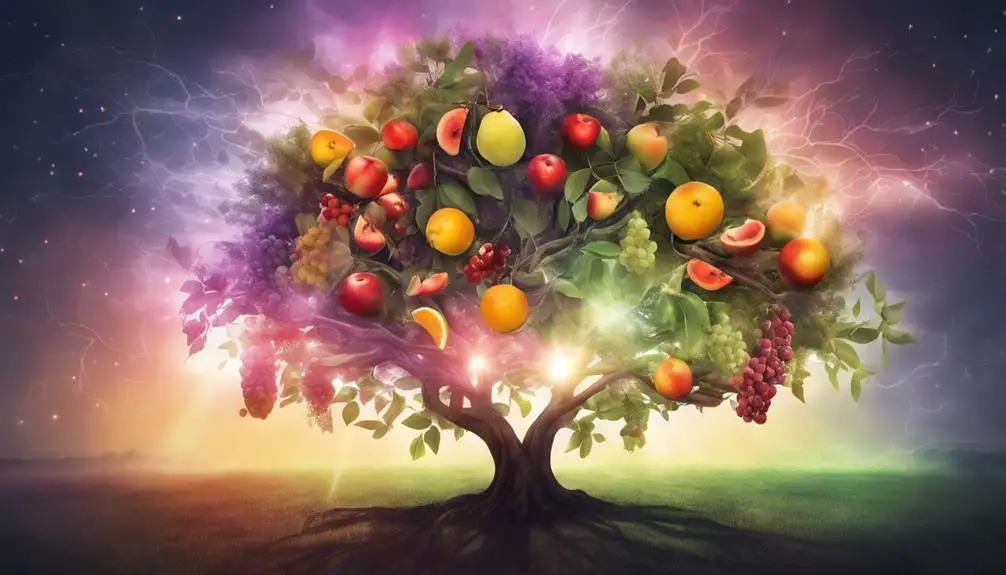Discover how sweetness in the Bible symbolizes divine providence and spiritual richness, inviting deeper exploration of faith's promises.

Sweet in the Bible
In the vast tapestry of biblical narratives, sweetness isn't just a flavor but a symbol woven through stories and prophecies, hinting at deeper spiritual truths. As you explore these scriptural passages, you'll uncover how honey, manna, and fruits aren't merely physical sustenance but also metaphors for divine providence, spiritual nourishment, and the richness of promised lands and blessings.
The intriguing part lies in how these elements of sweetness serve to both comfort and challenge believers, inviting you to ponder their significance in your own spiritual journey. What might these sweet symbols reveal about the nature of faith and the promises of God?
Key Takeaways
- Sweetness in the Bible symbolizes God's favor, abundance, and the pursuit of wisdom and righteous living.
- Words described as sweet in Proverbs highlight the importance of using speech to promote understanding, healing, and nourishment.
- Metaphors of honey, manna, and the Land of Milk and Honey reflect divine providence, care, and the promise of spiritual and material abundance.
- The concept of sweetness extends to character development, guiding believers towards spiritual growth and fostering communities rooted in love and divine purpose.
The Symbolism of Honey

In the biblical context, honey symbolizes abundance, prosperity, and God's favor, reflecting its esteemed status in ancient societies. You'll find that honey isn't just a sweetener but a significant emblem in religious texts, suggesting a divine connection and spiritual wealth. Honey rituals, for instance, often appear in scripture, underscoring honey's role in rites and ceremonies. These practices highlight the substance's importance in fostering spiritual connections and invoking blessings.
Delving deeper, bee symbolism complements the narrative around honey, embodying diligence, cooperation, and community. Bees, the producers of honey, are seen as models of industriousness and harmonious living, traits highly valued in biblical teachings. This duality of honey and bee symbolism enriches the scriptural messages, offering layers of meaning to the texts. The bee, through its labor and contribution to the sweetness of honey, becomes a metaphor for the believer's journey towards spiritual fulfillment and the collective effort in building a prosperous community.
Moreover, the mention of honey in sacred texts often accompanies narratives of promise and hope, acting as a metaphor for the spiritual 'land of milk and honey' that awaits the faithful. This connotation not only reinforces honey's status as a symbol of divine providence but also underscores its role in envisioning a future filled with God's blessings.
Thus, in analyzing the symbolism of honey in biblical texts, you're invited to appreciate its multifaceted significance. It's not merely about the physical sweetness but the deeper spiritual and communal connotations it carries, enriching the tapestry of biblical symbolism.
Manna From Heaven

Transitioning from the symbolism of honey, we now explore manna from heaven, a divine sustenance provided to the Israelites during their journey through the desert. This miraculous food is central to understanding wilderness nutrition and the ways in which divine intervention supports human needs in times of scarcity.
Manna's composition, described as like coriander seed, white, and tasting like wafers made with honey, suggests a complex carbohydrate source, possibly enriched with natural sugars and minerals essential for the sustenance of a population traveling through harsh conditions. Analyzing the composition and provision of manna offers insights into the broader themes of provision and faith in the wilderness.
Aspect |
Description |
Relevance |
|---|---|---|
Composition |
White, like coriander seed, taste of wafers with honey |
Indicates a blend of carbohydrates and natural sugars |
Collection |
Gathered daily, double before Sabbath |
Reflects principles of work, rest, and faith |
Provision |
Supernaturally provided for 40 years |
Demonstrates sustained divine care |
Purpose |
Meet nutritional needs in the wilderness |
Highlights God's attentiveness to human needs |
Symbolism |
Represents God's providence and care |
Stresses the importance of faith and obedience |
In analyzing manna from heaven, it's clear that its role extends beyond mere wilderness nutrition. It symbolizes a deeper spiritual sustenance, reflecting a divine commitment to meet both the physical and spiritual needs of the Israelites. This analysis not only sheds light on the historical and nutritional aspects of manna but also on its enduring significance as a symbol of divine provision and care.
The Land of Milk and Honey

Upon exploring the biblical narrative, one encounters the 'Land of Milk and Honey' as a metaphor for God's promise of abundance and prosperity to the Israelites. This phrase not only signifies a land flourishing with agricultural wealth but also symbolizes a divine assurance of well-being and sustenance. The term 'milk' refers to the pastoral wealth of the land, indicating the presence of livestock in good health, capable of producing milk in abundance. 'Honey,' on the other hand, represents the natural fecundity and the richness of the flora, pointing towards an environment where bees can produce honey in copious amounts.
The concept of a 'Land of Milk and Honey' serves as a powerful motivator for the Israelites, encapsulating the idea of promised abundance awaiting them, should they remain steadfast in their faith and adherence to God's commandments. It's a representation of the ultimate reward for their perseverance and trust in divine guidance, a land where their basic needs for food and sustenance aren't only met but exceeded.
Analyzing this metaphor within the context of the biblical narrative offers insights into the spiritual and material aspirations of the ancient Israelites. It underscores the importance of agricultural wealth as a cornerstone of societal prosperity and stability. Moreover, this promise of a bountiful land helps to forge a profound connection between the people and their deity, reinforcing their covenant and collective identity.
In essence, the 'Land of Milk and Honey' isn't just a promise of physical prosperity but also a testament to the faithfulness of God to His people, embodying a holistic vision of abundance that transcends mere material wealth.
Fruits of the Spirit

While the 'Land of Milk and Honey' symbolizes God's promise of material abundance, the Fruits of the Spirit represent a deeper, spiritual bounty bestowed upon believers who live in accordance with divine guidance. These fruits aren't just gifts but markers of spiritual growth and character development. When you embody these virtues, you're not merely adhering to a set of rules; you're transforming from the inside out, cultivating a life that resonates with the divine essence.
The Fruits of the Spirit are crucial for several reasons:
- They serve as indicators of your spiritual health and progression. Like a mirror, they reflect the depth of your relationship with the divine, showing how closely your life aligns with spiritual ideals.
- They're tools for character development, sculpting your inner being into a reflection of divine attributes. This transformation isn't instantaneous but evolves through persistent effort and dedication to living a life guided by spiritual principles.
- They impact your interactions with others, fostering a community rooted in love, peace, and mutual respect. By embodying these virtues, you contribute to a society where spiritual values are lived and celebrated.
Understanding the Fruits of the Spirit is essential for anyone serious about their spiritual journey. These virtues aren't just lofty ideals but practical guideposts for daily living. They challenge you to rise above the mundane and strive for a higher standard of being, one that's aligned with divine will and purpose. Through this, you achieve not just personal growth but contribute to the spiritual upliftment of humanity.
Sweetness in Proverbs

In the book of Proverbs, sweetness frequently serves as a metaphor for the pleasantness and desirability of wisdom and righteous speech. This association underscores the intrinsic value and attractive nature of moral and ethical teachings. Sweet words, as depicted in Proverbs, aren't merely pleasant to the ear but carry profound significance in guiding one's actions and decisions. The emphasis on the sweetness of wise counsel highlights its ability to influence and shape the character and destiny of individuals in a positive manner.
The metaphorical use of sweetness in relation to words and counsel in Proverbs serves a dual purpose. Firstly, it makes the concept of wisdom more relatable and desirable to the reader. Just as sweetness in taste is universally perceived as enjoyable and sought after, positioning wisdom and righteous speech in the same category encourages readers to pursue these virtues. Secondly, it illustrates the impact of wise counsel on the soul and life of an individual. Just as sweetness enhances the flavor of food, wise words enrich the mind and spirit, guiding individuals toward a fulfilling and righteous life.
Proverbs effectively uses the concept of sweetness to convey the importance of choosing one's words carefully and the value of seeking and offering wise counsel. It suggests that words have the power to nourish and sustain the soul, similar to how sweet food delights the senses. The comparison invites readers to reflect on the quality and nature of their speech and to value the wisdom that comes from righteous counsel.
Frequently Asked Questions
How Does the Concept of Sweetness in the Bible Relate to Modern Dietary Practices and Health Concerns About Sugar Consumption?
You're exploring how modern dietary practices and health concerns about sugar consumption can be informed by historical perspectives on sweetness.
Sugar alternatives play a vital role in this discussion, as the increase in sugar intake is linked to modern diseases like diabetes and obesity.
Analyzing the shift from natural sweeteners to refined sugars reveals a complex relationship that challenges us to rethink our dietary choices and their long-term impacts on health.
Are There Any Biblical Restrictions or Guidelines About Consuming Sweet Foods, and How Do They Compare to Other Ancient Texts?
You're exploring if ancient texts, including the Bible, set specific stipulations on savoring sweet substances like honey or interpret sugar symbolism.
Unlike modern dietary guidelines, biblical references, notably honey laws, don't directly correlate to today's health concerns over sugar intake. Instead, they often symbolize abundance and wellness.
Comparatively, other ancient writings might mirror or diverge in their depiction of sweets, yet none provide the precise dietary directives found in contemporary nutritional advice.
How Was Sweetness Perceived in Biblical Times in Contrast to Bitter or Salty Tastes, and What Cultural or Religious Significance Did This Perception Hold?
In biblical times, sweetness, often symbolized by honey and fruit references, contrasted sharply with bitter or salty tastes, holding significant cultural and religious importance.
You'd find that sweetness wasn't just a flavor but a symbol of prosperity, health, and divine favor.
In contrast, bitterness and saltiness could represent life's hardships or preservation.
This perception showcases a deeper, symbolic understanding of taste and its implications in ancient societies.
Can the Metaphorical Use of Sweetness in the Bible Offer Insights Into Ancient Attitudes Towards Happiness, Pleasure, and Well-Being?
Imagine analyzing literature to uncover how happiness was depicted through flavors. By applying metaphor analysis to texts, you'd see how sweetness often represents happiness and well-being.
This approach, akin to dissecting happiness metrics, reveals ancient attitudes toward joy and contentment. Such analysis not only enriches our understanding of historical perspectives on pleasure but also illustrates how deeply ingrained these concepts are in human culture, transcending mere taste to embody emotional states.
In Biblical Narratives, Are There Any Instances Where Sweetness Is Associated With Temptation or Sin, and How Do These Instances Influence the Overall Moral Teachings of the Bible?
You're exploring how temptation symbolism and moral contrasts are portrayed through sweetness in narratives. This approach highlights instances where sweetness isn't just pleasurable but also a lure towards sin, thereby enriching our understanding of biblical moral teachings.
Conclusion
In the tapestry of biblical narratives, sweetness isn't just a taste but a profound symbol. From the divine delivery of manna to the promised land flowing with milk and honey, these symbols offer a glimpse into God's benevolence and the spiritually rich life.
Like an ancient GPS guiding the faithful, sweetness in scripture points towards divine provision, moral integrity, and the fruits of a life lived in harmony with the Spirit. Thus, sweetness transcends mere flavor, embodying spiritual nourishment and divine promise.


Sign up